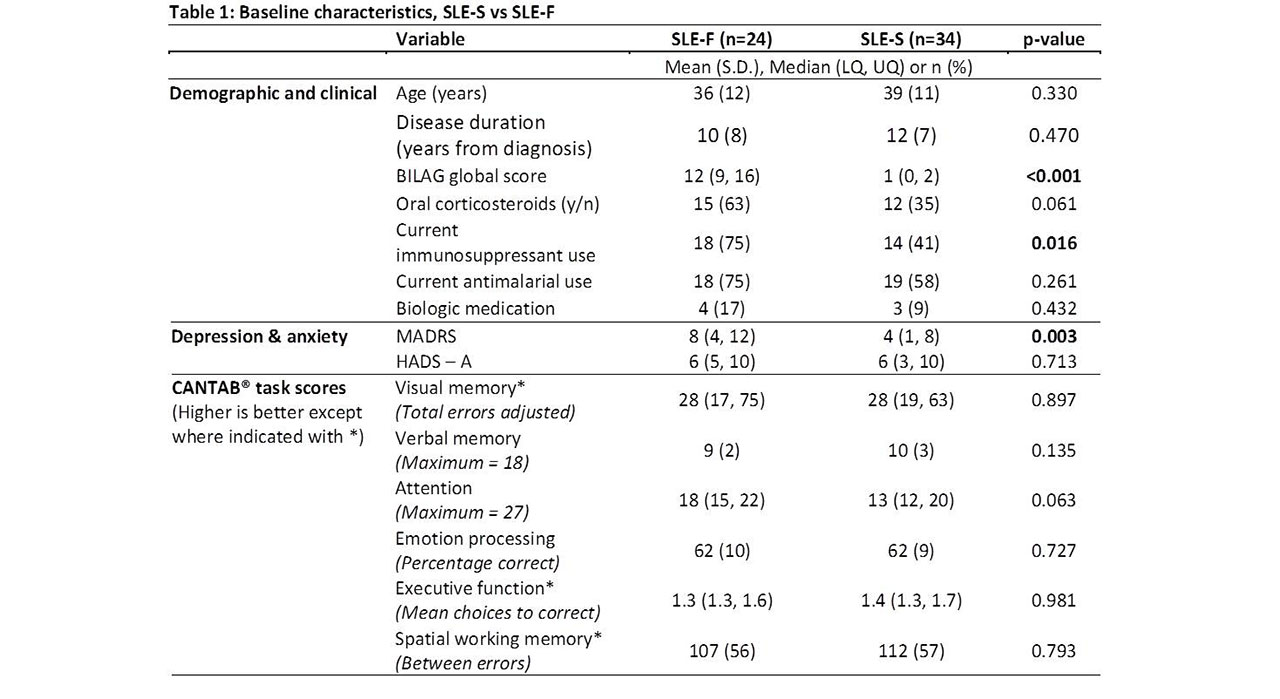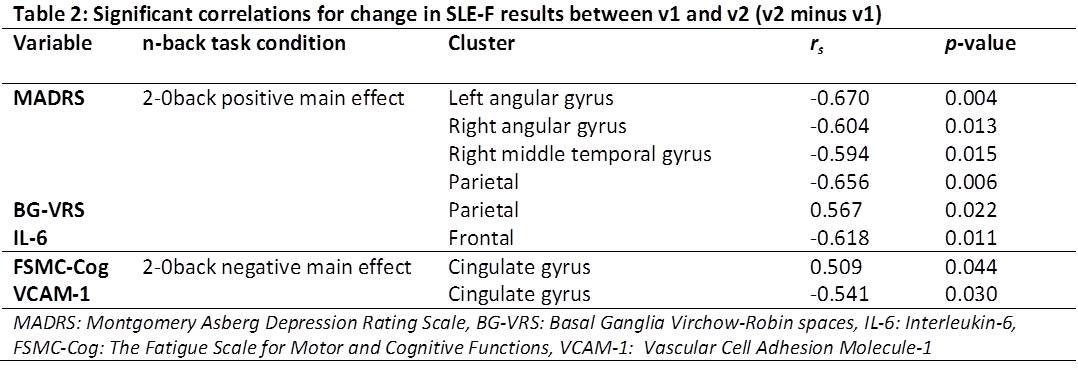Session Information
Session Type: Poster Session (Monday)
Session Time: 9:00AM-11:00AM
Background/Purpose: Cognitive dysfunction (CD) is a common symptom in systemic lupus erythematosus (SLE), that significantly affects quality of life but there are limited treatment options available. There are many factors causative of CD which are shared with other chronic diseases. However, CD is more prevalent in SLE than in other conditions, such as rheumatoid arthritis. This suggests a direct link between SLE and CD but the effect of disease activity on CD in SLE is still unclear. The aim of this study was to investigate the effects of active disease in SLE on CD. We compared cognitive measures in SLE patients with stable disease activity (SLE-S) to those with active disease (SLE-F).
Methods: 34 SLE-S and 24 SLE-F were recruited, all meeting 1997 ACR or SLICC criteria. Active disease was defined as BILAG A or B with a change in treatment. Stable disease was defined as SLEDAI-2K ≤4. 17/24 SLE-F patients were assessed again at a 2nd visit (v1 vs v2), approximately 4 months later. CD was measured using a computerized battery of tests (CANTAB®). fMRI was used to examine neuronal responses to a working memory and attention task (n-back) and a facial emotional processing task (FERT). Analyses compared the SLE-S to the SLE-F group and SLE-Fv1 to SLE-Fv2 for “responders” only. Responders were defined as having a decreased BILAG score at their second visit. Exploratory correlations were also undertaken, for all of the SLE-F group who had 2 visits, using delta scores. fMRI data were analysed using SPM12. All other data were analysed using SPSS 22.
Results: There were no differences between the SLE-S and SLE-F groups or between v1 and v2 on demographic and clinical measures except disease activity. The SLE-F group scored higher than the SLE-S group on the MADRS depression scale (p=0.003) but no other significant differences in psychiatric symptoms were observed. There were no significant differences on CANTAB® performance for either comparison (table 1). The fMRI showed a SLE-S vs SLE-F difference in n-back related response in the medial prefrontal cortex (p=0.012; figure 1) but no differences on the FERT. There were no differences in the n-back or FERT for the SLE-F v1 vs v2 comparison. However, the exploratory correlations showed changes in BOLD signal response were associated with changes in the MADRS (depression score), BG-VRS (basal ganglia Virchow-Robin spaces), IL-6, vascular cell adhesion molecule-1 (VCAM-1) and FSMC-cognition (cognitive fatigue measure) (table 2).
Conclusion: Flares in SLE are associated with both increased inflammatory markers and depression scores. Compensatory brain mechanisms to maintain cognitive function may negatively affect mood during flares and this adversely affects overall cognitive function independent of the active phase response. Reduction in inflammation over time also influences cognitive function and so consideration of mood and disease activity is needed when treating flares.
Acknowledgements:
This study was partially funded by an unrestricted grant from Sanofi Genzyme and supported by the NIHR Manchester Biomedical Research Centre.
To cite this abstract in AMA style:
Barraclough M, McKie S, Parker B, Jackson A, Pemberton P, Elliott R, Bruce I. Disease Activity and Cognitive Function in Systemic Lupus Erythematosus [abstract]. Arthritis Rheumatol. 2019; 71 (suppl 10). https://acrabstracts.org/abstract/disease-activity-and-cognitive-function-in-systemic-lupus-erythematosus/. Accessed .« Back to 2019 ACR/ARP Annual Meeting
ACR Meeting Abstracts - https://acrabstracts.org/abstract/disease-activity-and-cognitive-function-in-systemic-lupus-erythematosus/



